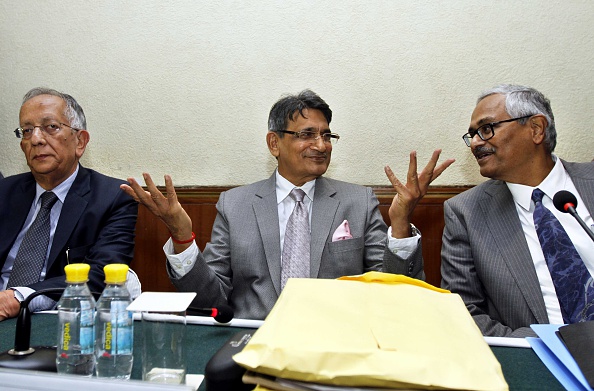
Justice Lodha's 10 Commandments for BCCI : A quick roundup of facts

Following the IPL betting and spot-fixing scandal, the Supreme Court of India formed a Committee headed by Justice R.M. Lodha, to suggest corrective measures to the BCCI for a complete overhaul of its existing system. A year later, in early 2016, the Committee submitted its report, recommending sweeping reforms to restore the dignity of the sport and its administration in the country.
Since then, the two have been at loggerheads and the BCCI has put down many of its recommendations as impractical and refusing to implement them.
Also Read: BCCI vs The Supreme Court: A detailed timeline of everything as it happened
Much of the off-field drama is alien to the average cricket fan engrossed in the on-field action, and rightly so. However, as the BCCI vs Lodha war reaches its climax, it is beyond denial that this report could have far-reaching consequence in changing the way the game is governed and followed in the country.
Here are some of the key recommendations and their implications, detailed in simple terms:
#1 BCCI under RTI Act
The Lodha panel recommended bringing the BCCI under the scope of the Right to Information (RTI) Act 2005, as a step towards transparency.
The Act empowers citizens to enquire into the functions of public authorities covered by it, and owned, controlled or substantially financed by the government, or non-Government organisations substantially financed by funds provided by the government.
The BCCI claims that it is an independent authority, registered as a society, under the Tamil Nadu Societies Registration Act, and thus, beyond the scope of RTI.
However, it was argued that, by representing the national team and benefitting from concessions and public facilities from the government for the smooth conduct of the game, the Board is discharging public functions and answerable to inquiry.
#2 Legalisation of Betting and Criminalisation of Fixing
Betting is the act of gambling on the outcome of a match or certain parts of it. Though it is a thriving business in many countries, legal betting in India is confined to the sport of horse racing.
Match or spot fixing is gambling accompanied by the influencing of the outcome of a match or certain ‘spots’ in it for which bets are made, through the players involved.
The Lodha Committee recommended legalisation of betting for all, with the exception of players, teams, match officials, and administrators. Betting restricted to licensed betting houses can protect the game from corrupt practices while also generating revenue for the government through taxes.
Revenue from legal betting can be utilised for the development of sports infrastructure and other noble causes. Though the effectiveness of legalised betting in eliminating fixing from the game is debatable, by making fixing a criminal offence, a strong deterrent can be served to discourage the players and officials tempted by greed, from engaging in these acts.
#3 One State, One Vote
The issue of over-representation and under-representation of the States in the BCCI is examined by the ‘One State, One Member, One Vote’ proposal.
The states of Maharashtra and Gujarat make for a total of 6 votes and more grants than others, while Bihar, Uttarakhand, the North Eastern states (excluding Assam and Tripura) and Union Territories except Delhi, either have no representation or possess Associate, Affiliate and Future status.
Non-playing clubs like the National Cricket Club, Kolkata and the Cricket Club of India, Mumbai, and non-geographical teams like Railways, Services and All India Universities enjoy Full Member status and voting rights.
The Lodha panel intends to correct this irregularity by ensuring only associations representing a state would have full membership and voting rights. States with multiple associations should have one Full Member and the remaining members as Associates. This will be instrumental in making the game inclusive and equally representative of all geographical states in our country.
#4 Eligibility Criteria for Administrators
The panel, on observing that many individuals in the BCCI occupy various posts for multiple terms and on multiple occasions, laid down the following administrative guidelines:
i) Fixed terms of 3 years for office bearers
ii) No government officials and ministers can hold office
iii) No consecutive terms, with a mandatory cool-off period of 3 years between each term
iv) Age cap of 70 years for office bearers
Any office-bearer completing nine years in office or attaining the age of 70 will thus be disqualified from contesting further elections. While these reforms may succeed in eliminating political influence and absolute domination of individuals, a 3-year term may be too short a timeframe to make an impact and the cooling off period could put the brakes on a well-intentioned administrator.
These recommendations will completely revamp the BCCI and have thus been summarily rejected by them.
#5 Restriction on Advertising
The Lodha Committee had called for restrictions on excessive advertising during live cricket matches. They suggested that advertisements should be broadcast only during drinks, lunch, and tea intervals, and between innings changeover, as is the practice elsewhere, and entire space on the footage should be dedicated to the game, except for the logo of the sponsor.
Curbing of commercials will provide interruption-free telecast of live action to the viewers. They felt that, often, TV viewers were deprived of the live emotions and important moments of the game. However, advertisers pay huge sums for these spots between overs and the few seconds are a big source of revenue for the BCCI, who estimate a loss of revenue to the tune of Rs. 1500 crore from TV rights, if advertisements are restricted.
Later, the Committee assumed a more softer stand, asking the BCCI to make its own decision, weighing the interests of the cricket fan against the financial aspects of restricted advertisements.